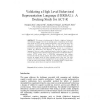Free Online Productivity Tools
i2Speak
i2Symbol
i2OCR
iTex2Img
iWeb2Print
iWeb2Shot
i2Type
iPdf2Split
iPdf2Merge
i2Bopomofo
i2Arabic
i2Style
i2Image
i2PDF
iLatex2Rtf
Sci2ools
175
click to vote
BICA
2010
2010
Validating a High Level Behavioral Representation Language (HERBAL): A Docking Study for ACT-R
We present a docking study for Herbal, a high-level behavioral representation language based on the problem space computational model. This study docks an ACT-R model created with Herbal to one created by hand. This comparison accomplishes several things. First, we believe such studies are necessary for achieving and demonstrating the theoretical rigor and repeatability promised by high-level representation languages. Second, it is necessary to evaluate the effectiveness and efficiency of high-level cognitive modeling languages if they are to make a significant impact in either the cognitive or social sciences. Third, this kind of study provides an opportunity to test Herbal's ability to produce ACT-R models from a GOMS-like representation that contains hierarchical methods, memory capacity, and control constructs. Finally, this study provides an example model for future validation work in this area. Our study addresses each of these points by docking Pirolli's [1] price find...
Act-r Models | BICA 2010 | Cognitive Science | Herbal | Model | Social Networks |
| Added | 15 May 2011 |
| Updated | 15 May 2011 |
| Type | Journal |
| Year | 2010 |
| Where | BICA |
| Authors | Changkun Zhao, Jaehyon Paik, Jonathan H. Morgan, Frank E. Ritter |
Comments (0)

